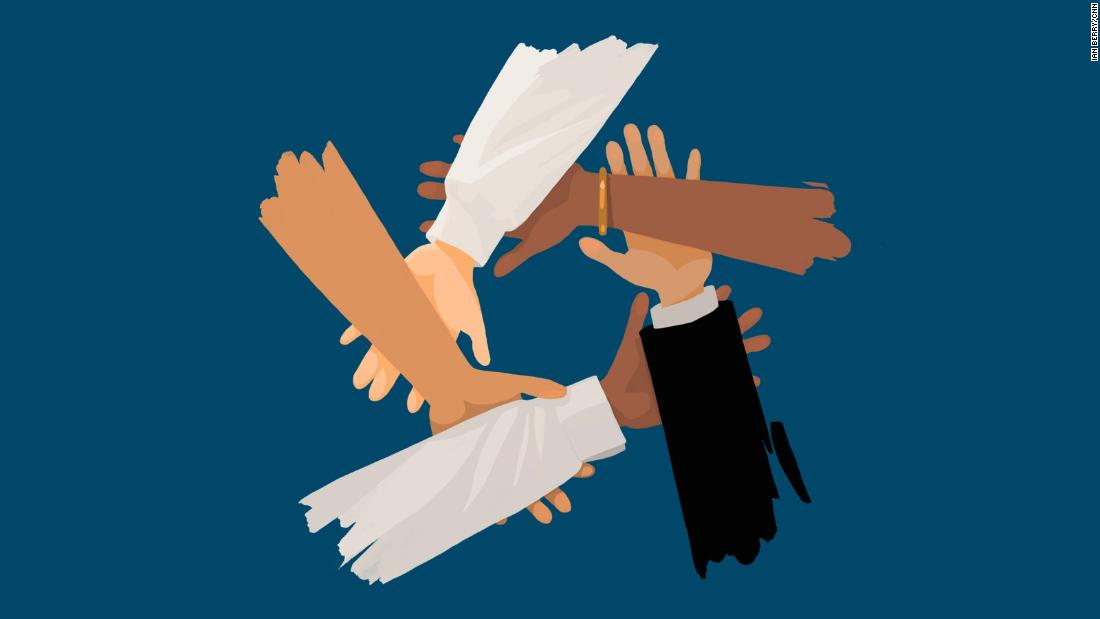
People in all kinds of industries are grappling with these issues, looking to do more to support their colleagues from different backgrounds.
Known as "allies," these people are usually from majority groups and they seek to end the oppression of those who are marginalized or stigmatized (men advocating for the advancement of women, for example, or white colleagues standing up for the rights of people of color).
"An ally is anybody that is interested in improving outcomes for stigmatized individuals," explains Isaac Sabat, assistant professor of organizational psychology at Texas A&M University. "People who are interested in advocating for the rights of others, someone who wants to support those who are stigmatized or minoritized, within a workplace context."
But potential allies often don't know how to start. Do white men attend events for women of color, to show support? When is it an intrusion and when is it allyship?
The process involves some education, and a healthy dose of self-awareness.
Knowing when to listen
A key part of the ally journey is listening.
The Salesforce Equality team, which is leading diversity and inclusion efforts at the company, has broken the core components of allyship into four distinct steps for their employees to heed: Ask, listen, show up and speak up.
Listening and asking questions can often feel like the hardest steps, says Molly Q. Ford, senior director of equality programs at Salesforce.
"We hear that 'If I never open my mouth, there's no foot-in-mouth moment,'" she says.
Knowing when to educate yourself
People from majority groups — white, straight or fully-abled people — sometimes need help figuring out how privilege and stigma operate in the modern workplace, and how they benefit from those entrenched systems.
Because people of color and those from marginalized backgrounds live with microaggressions and other types of biases and discrimination on a daily basis, they may already be familiar with the terms and language to talk about it, while white employees or those from other majority groups often need more education.
"If you live with this every day, you're like an expert in it," says Ali Michaels, director of the Race Institute for K-12 Educators in Philadelphia. "So maybe your skill building [for other employees] needs to be on a different level."
However, potential allies from majority groups have to be careful not to lean too heavily on people from the marginalized group, asking them to be their "experts."
"You got to do your own Google," Ford says. "There's that level of grace and forgiveness, but also taking the responsibility to educate yourself."
Knowing when to reach out
A big part of being a good ally is knowing when to offer support and comfort.
Ford remembers reaching out to an LGBTQ colleague after the Pulse nightclub shooting in 2016.
"We walked in treating him as if a member of his own family had been involved," Ford says. But a month later, when the shooting of Philando Castile made headlines nationwide, she looked for a similar display of allyship from her colleagues.
At first, no one reached out.
"I understand that's such a complex conversation — I get it," she says. "But I said something to [a colleague] and she said 'I should have reached out to you.' That's the sort of thing where I said, 'Wow, it's funny how we know when to reach out to communities sometimes. It's part of being an ally.'"
Knowing when to stand up
Good allies don't hide in the shadows, Sabat says. They show their support through their actions, or even by seemingly small things like attending events, adding comments on Slack or affixing stickers to their cubicles.
Research shows that confronting bad behavior in the moment — responding to someone's insensitive remark, say, or calling attention to the lack of representation in the room — can be more effective when it comes from an ally, Sabat says. If a person of color calls out a microaggression, people see them as complaining or self-serving. But when allies initiate a similar confrontation, other people in the room instead view it as objective.
"If you can signal your allyship identity, then it shows people that you are supportive and that you are there for them if something goes down and you have to step up," he says.
And remember: stepping up once isn't enough, Sabat says. Allyship is a continuous journey, one that grows with a career and with a person.
"Be open to criticism and feedback," he says. "If someone calls you out on the way you confronted or you said something problematic, be open to learning and growing as an ally as well."
No comments:
Post a Comment